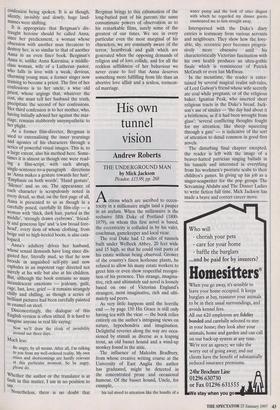His own tunnel vision
Andrew Roberts
THE UNDERGROUND MAN by Mick Jackson Picador, £15.99, pp. 268 Actions which are ascribed to eccen- tricity in a millionaire might land a pauper in an asylum. When the millionaire is the reclusive fifth Duke of Portland (1800- 1879), on whom this first novel is based, the eccentricity is colluded in by his valet, coachman, gamekeeper and local vicar.
The real Duke had 12 miles of tunnels built under Welbeck Abbey, 20 feet wide and 15 high, so that he could visit parts of his estate without being observed. Grower of the country's finest hothouse plants, he refused to allow his many estate workers to greet him or even show respectful recogni- tion of his presence. This strange, imagina- tive, rich and ultimately sad novel is loosely based on one of Victorian England's strangest, most imaginative, rich and ulti- mately sad peers.
As very little happens until the horrific end — by page 150 His Grace is still only having tea with the vicar — the book relies entirely on the author's intriguing views on nature, hypochondria and imagination. Delightful reveries along the way are occa- sioned by stimuli as diverse as a leaping trout, an old basset hound and a wind-up monkey found in the attic.
The influence of Malcolm Bradbury, from whose creative writing course at the University of East Anglia the author has graduated, might be detected in the concentrated prose and occasional humour. Of the basset hound, Uncle, for example,
his tail stood to attention like the handle of a water pump and the look of utter disgust with which he regarded my dinner guests enamoured me to him straight away.
Interspersed with the Duke's diary entries is testimony from various servants and neighbours. They show how the love- able, shy, eccentric peer becomes progres- sively more obsessive until his characteristically Victorian fascination with his own health produces an ultra-gothic finale which is reminiscent of Patrick McGrath or even Ian McEwan.
In the meantime, the reader is enter- tained by several magical realist sub-tales, of Lord Galway's friend whose wife secretly ate coal while pregnant, or of the religious baker, Ignatius Peak, who inserted short religious tracts in the Duke's bread. Jack- son's use of similes — 'the day had about it a brittleness, as if it had been wrought from glass'; 'several conflicting thoughts fought for my attention, like sheep squeezing through a gate' — is indicative of the sort of attention to detail common in good first novels.
The disturbing final chapter excepted, the reader is left with the image of a beaver-hatted patrician singing ballads in his tunnels and interested in everything from his workmen's psoriatic scabs to their children's games. In giving up his job as a singer-songwriter for the pop groups The Screaming Abdabs and The Dinner Ladies to write fiction full time, Mick Jackson has made a brave and correct career move.


































































 Previous page
Previous page